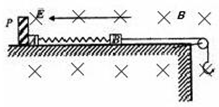如图所示,光滑绝缘水平桌面上固定一绝缘挡板P,质量分别为mA和mB的小物块A和B(可视为质点)分别带有+QA和+QB的电荷量,两物块由绝缘的轻弹簧相连,一不可伸长的轻绳跨过定滑轮,一端与物块B连接,另一端连接轻质小钩.整个装置处于正交的场强大小为E、方向水平向左的匀强电场和磁感应强度大小为B、方向水平向里的匀强磁场中.物块A,B开始时均静止,已知弹簧的劲度系数为K,不计一切摩擦及AB间的库仑力,物块A、B所带的电荷量不变,B不会碰到滑轮,物块A、B均不离开水平桌面.若在小钩上挂一质量为M的物块C并由静止释放,可使物块A对挡板P的压力为零,但不会离开P,则
(1)求物块C下落的最大距离;
(2)求小物块C下落到最低点的过程中,小物块B的电势能的变化量、弹簧的弹性势能变化量;
(3)若C的质量改为2M,求小物块A刚离开挡板P时小物块B的速度大小以及此时小物块B对水平桌面的压力.

(1)开始时弹簧的形变量为x1,
对物体B由平衡条件可得:kx1=QBE
设A刚离开挡板时,
弹簧的形变量为x2,
对物块B由平衡条件可得:kx2=QAE
故C下降的最大距离为:h=x1+x2=
(QA+QB)E k
(2)物块C由静止释放下落h至最低点的过程中,
B的电势能增加量为:
△Ep=QBEh=
QB(QA+QB)E2 k
由能量守恒定律可知:
物块由静止释放至下落h至最低点的过程中,
c的重力势能减小量等于
B的电势能的增量和弹簧弹性势能的增量
即:Mgh=QBEh+△E弹
解得:△E弹=
(Mg-QBE)(QA+QB)E k
故小物块C下落到最低点的过程中,小物块B的电势能的变化量为
QB(QA+QB),弹簧的弹性势能变化量为△E弹=E2 k
(Mg-QBE)(QA+QB)E k
(3)当C的质量为2M时,
设A刚离开挡板时B的速度为V,
由能量守恒定律可知:2Mgh=QBEh+△E弹+
(2M+mB)V21 2
解得A刚离开P时B的速度为:V=2MgE(QA+QB) (2M+mB)k
因为物块AB均不离开水平桌面,
设物体B所受支持力为NB1,所以对物块B竖直方向受力平衡:
mBg=NB1+QBvB
由牛顿第三定律得:NB=NB1
解得:NB=mBg-BQB2MgE(QA+QB) k(2M+mB)
故小物块A刚离开挡板P时小物块B的速度大小为:V=
,此时小物块B对水平桌面的压力为:NB=mBg-BQB2MgE(QA+QB) (2M+mB)k
.2MgE(QA+QB) k(2M+mB)
